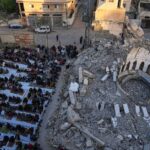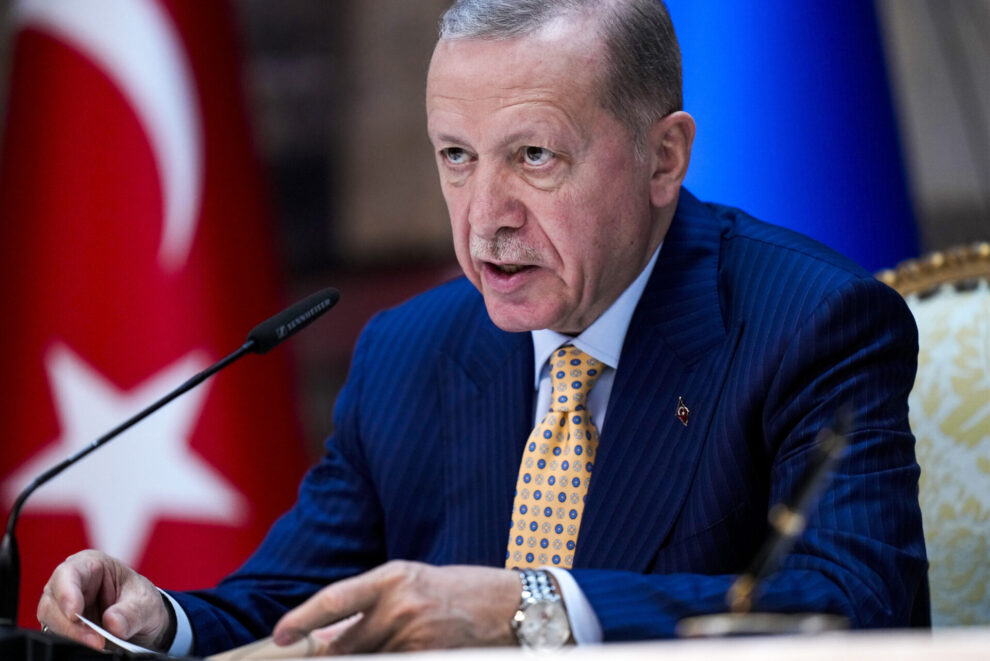Ankara (17/12 – 60). Turkish Defense Minister Yasar Guler said on December 15 that Turkey is willing to provide military training for Syria’s army if requested by the country’s new authorities. “[Turkey] is ready to provide the necessary support if the new administration requests it,” Guler said. Despite Ankara denying that it provided support for Hayat Tahrir al-Sham (HTS) — a designated terrorist group that led the overthrow of former dictator Bashar al-Assad’s regime earlier this month — President-elect Donald Trump characterized the post-Assad situation as an “unfriendly takeover” by Turkey during a news conference on December 16.
In a speech President Recep Tayyip Erdoğan called the situation a new reality. “There is now a new reality in Syria, politically and diplomatically. And Syria belongs to Syrians with all its ethnic, sectarian and religious elements,” Erdogan said in a speech in the southern Turkish city of Gaziantep.
“The people of Syria are the ones who will decide the future of their own country.” As much as it is a victory for Turkish President Recep Tayyip Erdogan, who sees his regional influence strengthened, it appears to be a major setback for his Russian counterpart, Vladimir Putin, threatened with losing his diplomatic influence in the region and his military bases in Syria.
“Neither the (terrorist group) PKK and its extensions in Syria nor Daesh/ISIS are our country’s interlocutors, but rather its enemies. Syria’s territorial integrity must absolutely be protected,” Recep Tayyip Erdogan said after a Cabinet meeting in the capital Ankara, citing two terror groups that tried to exploit the instability in Syria to carve out territory, including along Türkiye’s borders.
Türkiye, as Turkey is called today, welcomes the liberation of Tel Rifaat and Manbij, two Syrian cities that suffered for years from terrorist occupation despite promises made, said Erdogan.
Giving the names of Turkish provinces along the border, Erdogan said: “If one half of our heart is Gaziantep, Hatay and Sanliurfa, the other half is in (the Syrian cities of) Afrin, Aleppo, Hama, Homs and Damascus.”
Turkey maintains a few thousand troops in northern Syria who have launched a brutal onslaught targeting Syria’s Kurdish minority, including the U.S.-backed Syrian Democratic Forces (SDF). Turkey considers the SDF a terrorist organization because it is led by the Kurdish People’s Protection Units (YPG), which maintains a connection to the outlawed Kurdistan Workers’ Party. In a television interview after meeting with U.S. Secretary of State Antony Blinken on December 13, Turkish Foreign Minister Hakan Fidan said, “The elimination of the YPG is our strategic goal.”
Despite the overthrow of the Iran-allied Assad regime, Israeli Defense Minister Israel Katz said on December 15 that the “immediate risks [to Israel from Syria] have not disappeared and the recent developments in Syria are increasing the intensity of the threat.” Katz has previously called Turkish President Recep Tayyip Erdogan a “dictator” who “is slaughtering Kurds” while the world remains silent. Separately, Israeli Foreign Minister Gideon Sa’ar said on December 9 that the United States and other countries must safeguard minorities in Syria and that attacks against the Kurds, such as the recent occupation of the city of Manbij by the Turkey-backed Syrian National Army, “must stop.”
“By offering military assistance, Turkey is pulling out all the stops to portray HTS as a legitimate political entity that should determine the political future of a post-Assad Syria. Erdogan wants the international community to overlook HTS’s existing designation as a terrorist organization by the United Nations, the United States, the European Union, and Turkey itself, which is rooted in ISIS and al-Qaeda. While grooming HTS as a governing force, Ankara is poised to prosecute a military campaign against the U.S.-backed, Kurdish-led Syrian Democratic Forces (SDF), which has been instrumental in battling ISIS. Through Turkey’s ill-considered actions, the prospects of a stable and free Syria for all its peoples stand on a knife’s edge.”
“Turkey’s interest in training and supporting a new Syrian government defense force is far from benevolent. Turkey desires a government-backed security service in Syria that will further its goals, including fighting the Kurds and providing Ankara with a point of leverage with the new government. A security apparatus in Syria that also includes elements hostile to Israel would also benefit Turkey in the middle and long run.”















